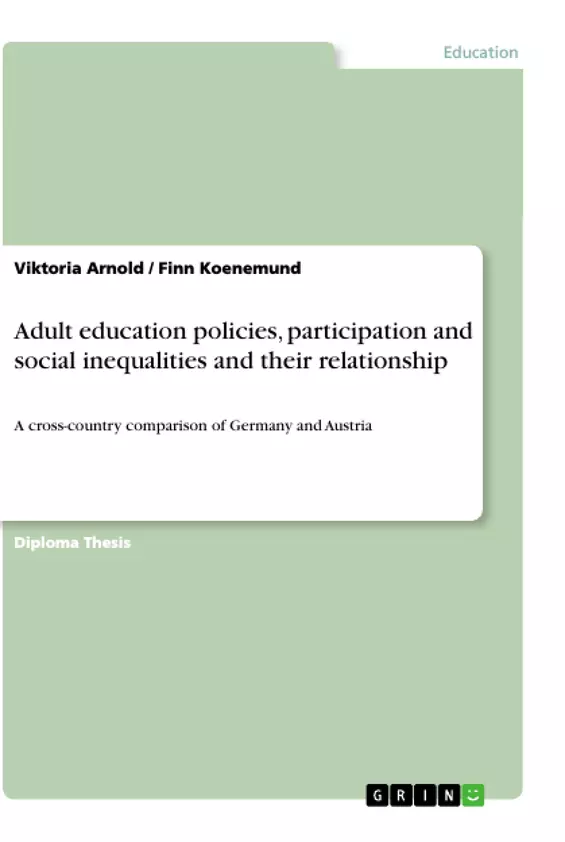This thesis specifically investigates incentive structures and the removal of barriers to enhance a more equal participation in adult education to prepare the workforce for upcoming challenges related to the future of work. It aims at contributing to this discussion and indicates how adult education policies can be used to possibly reduce socio-economic inequalities in accessing adult education and provide workers with the skills needed in the (future) labour market. This topic seems to be largely unexamined and no systematic cross-country comparison has been conducted in the past. While human capital accumulation in terms of primary education has been well investigated, research in the context of post-schooling phase, investigating the direct correlation between investing in (adult) education and its returns, largely remains a black box.
Two European countries that are considered particularly affected by automation will be examined, namely Austria and Germany. Whereas in Austria, 16.6% of jobs are at high risk of automation and 29.7% at risk of significant change, the figures for Germany are slightly higher with 18.4% of jobs at high risk of automation and 35.8% at risk of significant change, compared to an OECD average of 14% and 32% respectively. Additionally, both countries share similar institutional structures and are therefore considered comparable.
This thesis aspires to shed light on government intervention and the adult education market to possibly reduce social inequalities by setting incentives and removing barriers to enhance overall (and a more egalitarian) participation in adult education.
Finally, it seeks to contribute to the scientific and societal debate as well as to provide approaches on how to design effective, efficient, and egalitarian adult education policies. The research question to be answered aims at empirical hypothesis testing and is of explanatory nature.
Inhaltsverzeichnis (Table of Contents)
- Executive Summary
- List of Abbreviations
- Introduction and Research Question
- Future of Work and the Importance of Adult Education
- Theory and Hypotheses
- Methodology
- Quantitative Analyses and Results
- Conclusion and Discussion
- Policy Recommendations
- Literature
- Appendix
Zielsetzung und Themenschwerpunkte (Objectives and Key Themes)
This thesis examines the effectiveness of lifelong learning strategies in Austria and Germany in promoting adult education participation and addressing social inequalities. It uses a human capital theory approach to analyze the impact of policy interventions on individuals' incentives to participate and the barriers they face, particularly for underrepresented groups. The study focuses on the 2011 Austrian and 2019 German strategies and investigates their influence on participation rates and the factors hindering access to adult education.
- Impact of lifelong learning strategies on adult education participation
- Barriers to adult education participation, particularly for underrepresented groups
- Role of human capital theory in understanding adult education participation
- Cross-country comparison of adult education systems in Austria and Germany
- Policy recommendations for enhancing equity and inclusiveness in access to training
Zusammenfassung der Kapitel (Chapter Summaries)
- Introduction and Research Question: This chapter introduces the context of global changes in the world of work and the importance of adult education systems in facilitating adaptation to these changes. It highlights the impact of automation and the need for policies that address skills gaps and promote participation, especially for underrepresented groups.
- Theory and Hypotheses: This chapter delves into the theoretical framework underpinning the study, drawing on human capital theory and rational choice theory. It lays out hypotheses regarding the relationships between policy interventions, individual incentives, and participation rates in adult education.
- Methodology: This chapter describes the research methods employed in the study. It outlines the data sources, including the Adult Education Survey (AES), and explains the analytical techniques used, such as regression analyses, to examine the impact of policies on participation and barriers.
Schlüsselwörter (Keywords)
This thesis centers on the critical theme of adult education within a human capital theory framework. It explores the relationship between adult education policies, participation rates, and social inequalities through a cross-country comparison of Austria and Germany. The study investigates factors influencing participation, including incentives, barriers, and the effectiveness of policy interventions in promoting equity and inclusiveness in access to training. Key concepts include lifelong learning strategies, skills mismatch, underrepresented groups, and the impact of automation on the future of work.
Frequently Asked Questions
How do adult education policies address social inequalities?
Policies aim to reduce inequalities by setting incentives and removing barriers (such as costs or lack of time) to encourage participation among underrepresented and socio-economically disadvantaged groups.
Why is adult education important for the "Future of Work"?
Automation significantly threatens jobs in countries like Austria and Germany. Adult education provides the necessary skills for workers to adapt to technological changes and remain employable.
What is the Human Capital Theory in this context?
Human Capital Theory suggests that investing in (adult) education leads to higher productivity and better returns for both the individual and the economy, treating skills as an economic asset.
How do Austria and Germany compare in automation risk?
In Germany, 18.4% of jobs are at high risk of automation, while in Austria, the figure is 16.6%. Both are higher than the OECD average of 14%.
What are common barriers to participating in adult training?
Barriers include financial constraints, lack of time due to work or family responsibilities, and a lack of information or motivation among certain social groups.
- Citation du texte
- Viktoria Arnold (Auteur), Finn Koenemund (Auteur), 2020, Adult education policies, participation and social inequalities and their relationship, Munich, GRIN Verlag, https://www.grin.com/document/925183



